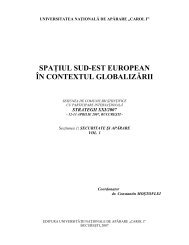PROVOCĂRI LA ADRESA SECURITĂŢII ŞI STRATEGIEI LA ÎNCEPUTUL SECOLULUI XXI
provocări la adresa securităţii şi strategiei la începutul secolului xxi
provocări la adresa securităţii şi strategiei la începutul secolului xxi
You also want an ePaper? Increase the reach of your titles
YUMPU automatically turns print PDFs into web optimized ePapers that Google loves.
controls, the common use of the benefits of the Social Security systems, the<br />
accreditation of academic courses and degrees...<br />
In 1976 a second step took place when elections to the European<br />
Parliament by universal suffrage were conducted. Although Parliament's<br />
competences were meager, for the first time, one of the key elements of<br />
citizenship, democratic participation, appeared.<br />
Later on, after the Fontainebleau European Council in 1984, a<br />
Committee of Europe of the Citizens, presided over by the Italian Euro MP<br />
Adonnino, was established. This committee approved a series of<br />
unambitious proposals leading to the constitution of a European citizenship.<br />
More audacious was the Project of Treaty of European Union,<br />
passed by the European Parliament, in February of 1984, and presented by<br />
the euro MP Alterio Spinelli (Spinelli Project).<br />
In spite of its restraint, the Single European Act (1986) hardly<br />
included any of the Spinelli's project proposals, although it adopted, and that<br />
is fundamental, the objective of a political European Union. In this manner,<br />
a few years later, two Intergovernmental Conferences were convened to<br />
reform the Treaties. One of them focused on the Economic and Monetary<br />
Union, the other one, solely on the political Union.<br />
A meeting of the European Council, which took place in Rome in<br />
October 1990, in the course of establishing the IGCs guidelines, introduced<br />
a notion of European Citizenship, as an essential element of the Treaties<br />
reform, and with some characteristics and similar rights to those that were<br />
later included in the Treaty of the European Union or Treaty of Maastricht.<br />
It was the Spanish delegation that first presented to the IGCs, in<br />
October 1990, a text on the European citizenship. After diverse negotiation,<br />
and with the enthusiastic support of the European Parliament that passed<br />
two favourable resolutions in 1991, the Treaty of the European Union came<br />
finally to institutionalize European citizenship.<br />
The extension of the rights<br />
For many, the rights included in the citizenship statute are limited<br />
and affect to a reduced number of Europeans, so they are considered as<br />
irrelevant by most citizens.<br />
The most significant is, with no doubt, free movement and<br />
residence of persons. Although there have been remarkable advances from<br />
the Treaty of Rome, where free movement was strictly bound to labour<br />
activity, there are still serious limitations that should be eliminated. Despite<br />
the different agreements reached, any country can re-establish controls on<br />
border whenever its security was considered to be threatened and residence<br />
freedom continues having different sort of restrictions [7].<br />
The other rights affect in a negligible way the daily life of<br />
European people: the right of appeal to the European Ombudsman only<br />
deals with matters under EU jurisdiction; the right of petition to the<br />
European Parliament already existed and has to do with a Parliament with<br />
very scarce competences; the right to vote and stand in local government<br />
and European Parliament elections in the country of residence affects to a<br />
minority of European, the right to have diplomatic and consular protection<br />
from the authorities of any other member State concerns solely the<br />
Europeans that visit a third country in which there are not embassies or<br />
consulates of its own state...<br />
Following the opinion of the eurosceptic Ralf Dahrendorf, the<br />
European citizenship lays still midway between two conceptions of<br />
citizenship: what he denominates theoretical or soft citizenship, certain<br />
feeling of being part of a community, of having some certain common goals<br />
and values, and the practical or strong citizenship, real rights -vote, fair trial,<br />
expression, association...- that can be claimed and juridical institutions to<br />
protect the exercise of these rights.<br />
The great debate in the following years will be: do we make steps<br />
forward to strengthen the Citizenship of the Union statute, or do we keep it<br />
as a largely theoretical institution?<br />
A step in the first direction has been the edition and proclamation in<br />
the Nice European Council of the Charter of Fundamental Rights of the<br />
European Union.<br />
The emergence of a European identity<br />
The concept of European identity is, at least, problematic. To some<br />
extent, a great part of our continent's inhabitants feel themselves as<br />
Europeans, but a majority feel more intensely their belonging to France,<br />
Portugal, Spain, or Catalonia, Scotland or Flanders. Identities are not easily<br />
separated and, often, different feelings of affinity -ethnic or racial group,<br />
gender, political ideas, cultural affinities...- are mingled.<br />
A genuine European Union requires a European identity, but it does<br />
not exist. There is no linguistic or cultural homogeneity. A common identity<br />
cannot be constructed on neither Christianism, nor democracy, nor<br />
economical identity, or, of course, ethnic identity [6].<br />
A lot of scholars have been lately trying to get to the bottom of<br />
what means to be a European.<br />
Samuel Huntington, a celebrated American academic, affirms that<br />
Europe finishes where Eastern Orthodox Christendom and Islam start. So,<br />
Greece, member State of the EU, is it not a European country? The Muslims<br />
that have been so long living any neighbourhood of London, Paris or<br />
Düsseldorf, are they not European?<br />
335<br />
336


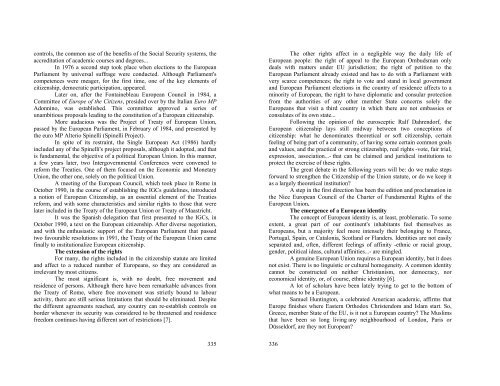
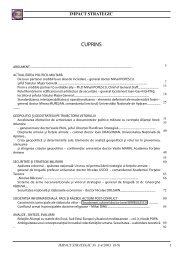


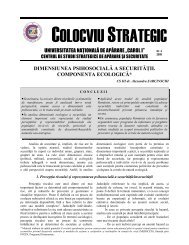
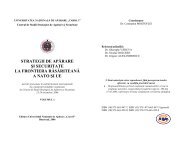
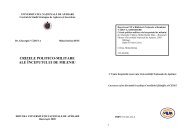
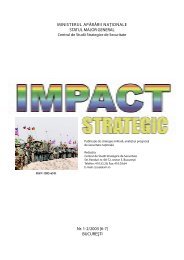




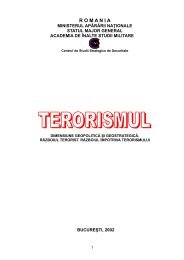

![„CAROL Nr 4 [29]/2008](https://img.yumpu.com/53801719/1/184x260/carol-nr-4-29-2008.jpg?quality=85)
